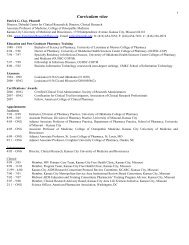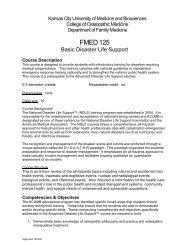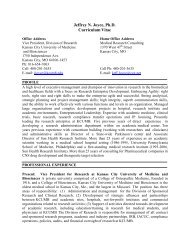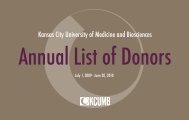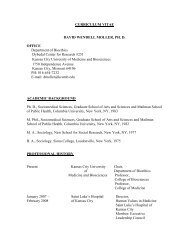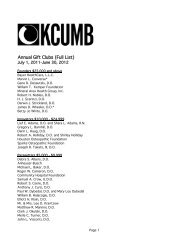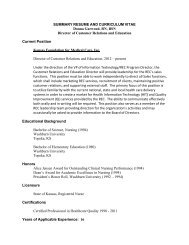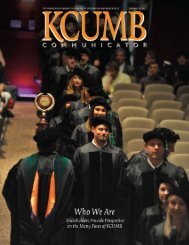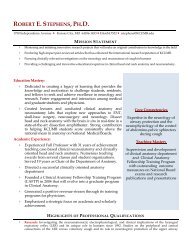2009-2010 KCUMB College Catalog - Kansas City University of ...
2009-2010 KCUMB College Catalog - Kansas City University of ...
2009-2010 KCUMB College Catalog - Kansas City University of ...
You also want an ePaper? Increase the reach of your titles
YUMPU automatically turns print PDFs into web optimized ePapers that Google loves.
student’s education. This means the borrower must live on personal expenses <strong>of</strong> $19,000<br />
($1,900 per month) for the 10-month period <strong>of</strong> his or her first year from all monies<br />
available to them, including personal resources, parental assistance, awards,<br />
scholarships and loans. Personal income from the previous year, the income <strong>of</strong> the<br />
student’s spouse, and the income <strong>of</strong> the student’s parents also are taken into account<br />
when figuring the amount a student can be awarded or can borrow.<br />
Money is available for a student’s direct educational costs and personal support while<br />
he or she receives an education. The student must be frugal and a good money manager<br />
to make the budget work comfortably. The primary federal sources are the subsidized<br />
and unsubsidized Stafford and GradPLUS loan programs. The subsidized Stafford loan is<br />
a low-interest program on which the government pays the interest while the student<br />
borrower is in school and is the loan <strong>of</strong> first choice. The unsubsidized Stafford and<br />
GradPLUS loans accrue interest from disbursement and are the loans <strong>of</strong> last resort. Refer<br />
to “Loan Programs and Sources” for maximum borrowing amounts for each program.<br />
A student may not be eligible for the full amount <strong>of</strong> loans based on his or her needs<br />
analysis application (FAFSA) and the <strong>KCUMB</strong> standardized student budget (Cost <strong>of</strong><br />
Attendance). The amount a student can borrow is based on the cost <strong>of</strong> his/her education<br />
and potential personal contributions, not on the student’s desire for capital.<br />
Students must carefully consider the repayment implications <strong>of</strong> loan programs and<br />
avoid excessive borrowing. <strong>KCUMB</strong> has a federally mandated obligation to keep a<br />
student’s indebtedness to a minimum. A student will receive counseling while in school<br />
about the nature <strong>of</strong> his/her debt and the projected payment schedule. Borrowing money<br />
from these programs is a privilege, not a right; the regulations controlling these<br />
programs change periodically.<br />
The <strong>KCUMB</strong> Financial Aid Office personnel are available to assist students in<br />
financing their educations. The staff will help find money for the student, but the primary<br />
responsibility for the financing <strong>of</strong> a student’s education lies with the student. This means<br />
that such things as supplying personal documentation, supplying family documentation,<br />
ensuring that a student qualifies for loans by having a favorable credit report and<br />
providing monies for prior commitments are the student’s obligations under the system.<br />
Default <strong>of</strong> a student loan is failure to repay the loan according to the terms agreed to<br />
in the promissory note. Default also may result from failure to submit requests for<br />
deferment on time. If a student defaults, the college, the organization that holds the loan,<br />
the state and the federal government can all take action to recover the money.<br />
The federal government and the loan agencies can deny a school’s participation in the<br />
student loan programs if the school’s default rate is too high. The <strong>University</strong> will<br />
withhold the transcript <strong>of</strong> any student who is in arrears or in default under any loan or<br />
loan program where such arrearage or default adversely affects the <strong>University</strong> in any way.<br />
Standards for Satisfactory Academic Progress<br />
Federal law and regulations require that all students receiving financial assistance<br />
from Title IV and Title VII programs must maintain satisfactory academic progress.<br />
62





